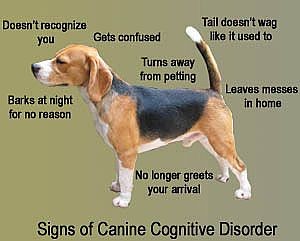-
Adopt
-
Veterinary Care
Services
Client Information
- What to Expect – Angell Boston
- Client Rights and Responsibilities
- Payments / Financial Assistance
- Pharmacy
- Client Policies
- Our Doctors
- Grief Support / Counseling
- Directions and Parking
- Helpful “How-to” Pet Care
Online Payments
Referrals
- Referral Forms/Contact
- Direct Connect
- Referring Veterinarian Portal
- Clinical Articles
- Partners in Care Newsletter
CE, Internships & Alumni Info
CE Seminar Schedule
Emergency: Boston
Emergency: Waltham
Poison Control Hotline
-
Programs & Resources
- Careers
-
Donate Now
 Joel Kaye, DVM
Joel Kaye, DVM
generalmedicine@angell.org
617-524-5733
angell.org/generalmedicine
Canine Cognitive Dysfunction is an age-related onset of impaired cognitive behaviors that cannot be wholly attributed to sensory or motor impairment or other medical conditions.
Canine Cognitive Dysfunction shares some similarities with human Alzheimer’s disease. Both experience amyloid plaques, impaired glucose metabolism, and free oxygen radical damage. People also undergo a change called neurofibrillary tangles that dogs do not. This is likely due to the fact that pets do not live as long as humans.
Symptoms
- Disorientation is one of the principal symptoms seen. The dog appears lost in previously known locations such as the yard or house. S/he may get stuck in corners or under/behind furniture. Another common symptom reported is waiting at the hinge side of the door for it to open.
- Disturbances in activity and sleep patterns. The pet may sleep more during the day, but less at night. There is an increase in purposeless activity such as pacing and wandering. They may also exhibit compulsive behaviors such as circling and vocalizing.
- Loss of housetraining. The pet may forget why it is outdoors and urinate or defecate in the house despite being outside just prior.
- Decrease in social interactions with people and other pets. The pet may seek less attention from the owner and interact less with resident pets. They may also become more anxious or aggressive.
Many of these symptoms overlap with many of the metabolic and neurologic diseases that can be seen in older pets. It is imperative the pet have a full exam, general lab tests and possibly a neurologic exam to rule out other causes. Medical problems must be eliminated before senile symptoms can be attributed to cognitive dysfunction. There is no one specific test for cognitive dysfunction. The chart below summarizes some of the changes to look for in your pet. Up to 50% of pets over the age of 10 will demonstrate one or more of these behaviors indicating some degree of cognitive decline.
Treatment
There is only one FDA-recognized treatment for Canine Cognitive Dysfunction; a drug called Anipryl-Selegiline Hydrochloride which does the following:
- Increases Dopamine concentration and metabolism
- Reduces the levels of harmful substances that damage brain cells
- Protects nerve cells from free radical oxygen damage
- Promotes synthesis of nerve growth factors
Other treatment options include Nicergoline and Propentofylline which have neuroprotective properties based on their ability to promote blood flow to the brain.
Additional treatment options that have focused on nutritional supplements include:
- Antioxidants: shown to reduce neuropathology. They act by combatting free radicals. Examples include Hills B/D diet Sam-e(Denosyl, Novifit).
- Calcium Channel blockers (Neutricks): They help protect against mitochondrial damage.
- Phosphatidylserine ( Senilife, Activait: This helps with memory.
Prevention
Keeping your pet physically and mentally active and at a good weight can possibly help prevent Cognitive Dysfunction and promote overall health. Toys that make your pet think to get food or rewards are a good way to keep them mentally sharp. Also practicing preventative health by visiting your veterinarian at the first signs of behavioral and or medical changes is imperative.
